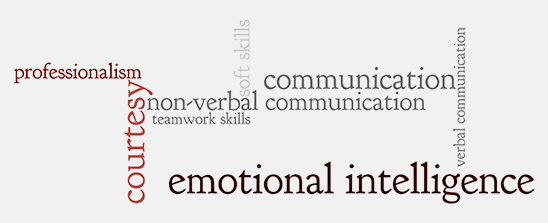Emotional Intelligence

Developing Emotional Intelligence in Occupational Therapy Students to Increase Success during Fieldwork Experience and as Practicing Clinicians
What is Emotional Intelligence?
Emotional intelligence is defined as the ability to perceive, understand, use, and manage emotions both within oneself and in interactions with others (Beauvais, Brady, O’Shea, & Quinn Griffin, 2011). Within emotional intelligence, there are soft skills. Soft skills are a set of attitudes and behaviors which not only augment interpersonal interactions but also promote relationship building (Deepa & Seth, 2013; Gonzalez, Abu Kasim, & Naimie, 2013). Soft skills entail intrapersonal and interpersonal qualities which are broadly applicable and include communication, courtesy, flexibility, professionalism, responsibility, positive attitude, integrity, and teamwork abilities (Robles, 2012).
Emotional intelligence can influence one’s ability to work with other health professionals. Soft skills are strategic to effective performance across all job categories. The need for soft skills is especially important within the field of healthcare. Attributes of effective communication, professionalism, courtesy, and teamwork skills are essential in promoting collaboration among health care professionals and in establishing and maintaining the client-health care professional relationship (Reynolds, 2009). (Deptula & Chun, 2013; Gonzalez et al., 2013).
Emotional Intelligence for Health Professionals
Research has shown that a positive interaction between a health professional and client can lead to improved responsibility on the part of the client, for his/her condition (Reynolds, 2009). Deficiencies in skills such as professionalism have been shown to result in adverse effects on patient safety, patient satisfaction, and failure of the patient to adhere to treatment regimes (Deptula & Chun, 2013). On the other hand, skills such as listening and demonstrating empathy have been shown to create a caring environment which builds trust and rapport between the client and health professionals (Beauvais, Brady, O'Shea, & Quinn Griffin, 2011; Gonzalez et al., 2013). The rapport between the health professional and client can greatly assist in the design of interventions and facilitation of client participation within the treatment process.
Emotional Intelligence During Clinical Education
Research indicates that occupational therapy students entering their Level I and II fieldwork experiences may lack these sets of skills (James & Musselman, 2006). Brown, Williams and Etherington (2016) found that emotional intelligence factors such as emotional awareness of others, emotional reasoning, and emotional management were significant predictors of occupational therapy student success in fieldwork. Naidoo and Wyk (2016) highlighted students’ concerns in the clinic, particularly the difficulty of establishing professionalism within a supervisor-student relationship, and the need for improved professionalism between clinical educators and students. The lack of these soft skills during fieldwork experience can strain fieldwork students’ professional relationship with their clinical educators (supervisors) and result in fieldwork failure (James & Musselman, 2006). By improving the student- supervisor relationship with learned emotional intelligence skills, students can increase their learning, confidence, and competency as they progress through fieldwork.
Emotional Intelligence Vignettes
The vignettes found on this webpage were designed, developed, and produced following an evidenced-based approach. The scenarios featured in the vignettes were developed with data collected through an extensive literature review and feedback from alumni and clinical educators collected through quality assurance surveys. The curriculum can be used by academic health care programs, students, clinical educators, and clinicians to develop effective emotional intelligence skills.
Please refer to the Manual page for best practices in implementation of Emotional Intelligence education.